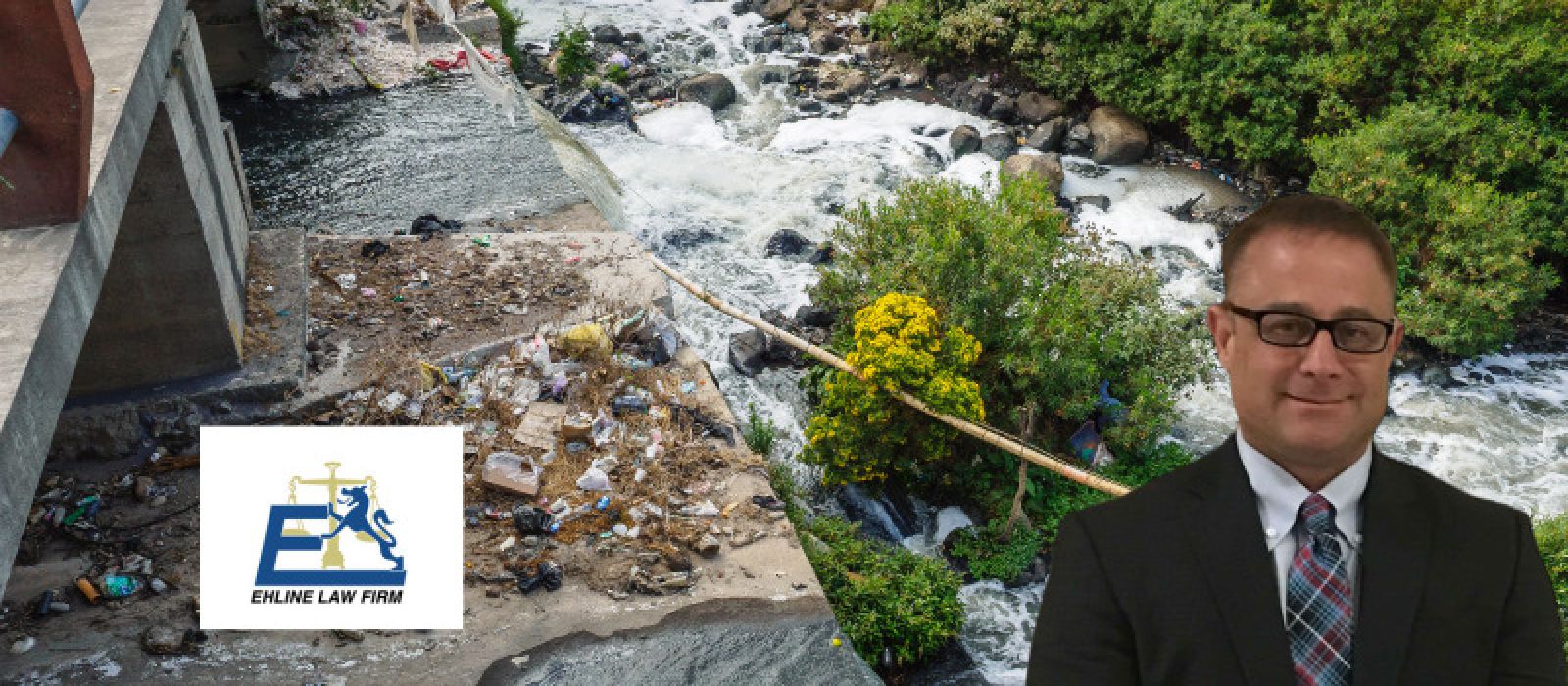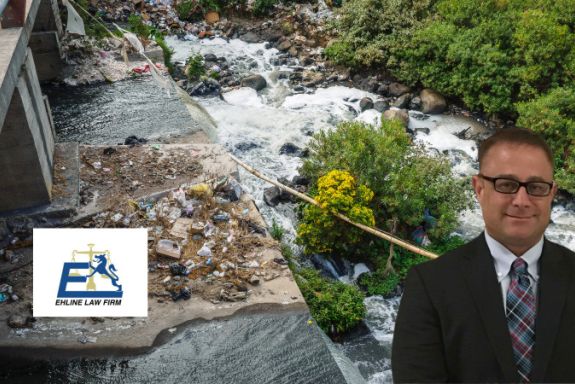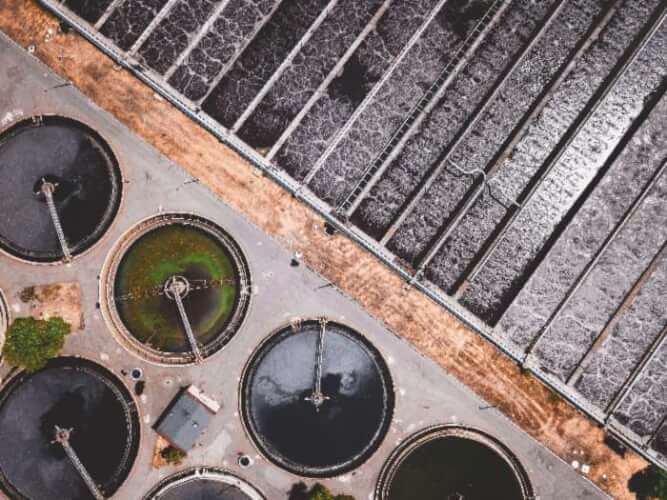

If we don’t win, you don’t pay.
NO WIN – NO FEE

ON CALL 24/7

U.S. Marine

Drinking water should be safe for everyone across the country. Still, many companies have placed toxic chemicals into pipes and sewers, making it dangerous for people to consume their water. Our top Los Angeles personal injury attorney, Michael Ehline, breaks it down here.

Environmental Protection Agency Can’t Be Everywhere
No one has said that people don’t need clean water to stay healthy, but water contamination continues in the US, causing many toxic tort cases in courts throughout America.
And the Environmental Protection Agency (EPA) can’t protect all our natural resources in real-time. So the underground aquifers and water supply, especially on USMC bases like Camp Pendleton, Camp Lejeune, or El Toro Air Station, has become poisoned and contaminated in certain areas.
Since contaminated water can happen to rivers, reservoirs, lakes, underground water, and rain, those who are a part of the water contamination, including negligent water suppliers, must be held responsible. However, this is easier to do when people have water contamination attorneys.
Did You Ingest Toxic Chemicals?
Did you discover gasoline additive or other chemicals in your drinking water? Do you live near a hydraulic fracturing operation and find yourself experiencing skin rashes and other health problems? Ehline Law Firm is here to help people get the compensation they deserve for this growing problem in the US.
We can help you recover just compensation for your medical bills and the parties or party responsible for adding toxic chemicals like Perfluorooctanoic Acid (PFOA) and other chemicals like Perfluoroalkyl substances into private wells.
If you have a water contamination case like this, you will need the services of top-notch water contamination attorneys.
We fight for safe water. We fight for clients injured by contaminant-laced drinking water.
The Public Drinking Water Systems in America
This isn’t just military bases with illness complaints over toxic water exposure. Around ninety percent of Americans get their water from public drinking water systems regulated by the Environmental Protection Agency. These public water systems can be either publicly or privately owned.
The Environmental Protection Agency will regulate the public water supplies of drinking water quality and set the concentration levels of the chemicals and pollutants.
This oversight happens because the agency understands the human body and poisons. They want water contamination monitored by companies and government agencies that provide water to people. Right now, there are two ways that people gather water in their homes.
- Surface Water: Water is collected in rivers, streams, lakes, and reservoirs. The system will take water from these areas, treat it and then give it to homes so long as it meets state regulations.
- Groundwater: Water collected in spaces and pores within rocks is groundwater. The system will drill wells into these areas and pump water to the surface. Still, many companies do not always treat this water to drinking water standards before delivering it to the community water systems in homes.
What Are Some Common Sources of Contaminated Water?
There are many reasons why contaminated water happens in the US, but these are some of the most common contaminant culprits:
- Industrial Dumping or Spilling: Chemicals, salt, oil, and other toxic waste can be accidentally or intentionally dumped into ponds that will make their way into someone’s drinking water.
- Storage Tanks: More than 10 million storage tanks in the US hold different gases, oils, and chemicals. However, many of these tanks are old and decaying, so the toxins leak and seep into the ground and nearby water.
- Abandoned or Uncontrolled Waste Sites: Research shows that around 20,000 abandoned or uncontrolled waste sites across the country have hazardous materials. Having these sites is dangerous to drinking water because it can release toxins into the ground and water nearby.
- Road Salt: Even though road salt is needed to help with de-icing during the winter months, it can still be a part of the water contamination problem in the country.
Know the Water Laws and Regulations
Since 1948, the US has had clean water laws in place to try and keep people safe. However, in the 1970s, two new laws were put into place that would help protect people and their drinking water rights.
The Clean Water Act
In 1972, the government expanded and reorganized the Clean Water Act. This is the skeletal structure that all companies need to follow when it comes to releasing pollutants into surface waters. The pollution control programs implemented have set the bar for national water quality. Individual states can set their controls for water pollution and quality, but it needs to meet the standards set by the federal government.
Safe Drinking Water Act
The Safe Drinking Water Act came about in 1974, and it is a federal law that protects and regulates drinking water taken from public sources like springs, lakes, rivers, and groundwater wells. There is a max of 90 contaminants allowed in drinking water. Also, these water supplies need to be regularly tested by representatives, and they need to report their findings.
If any of the water is above the threshold, it needs to be cleaned. Also, if contaminated water is found, but a company will not do anything to rectify this situation, then they can be forced to do so by the government.
PFSAS: What Are They, and Are There Concerns?
PFSAS are human-made chemicals, and they are at the center of water contamination. These chemicals have been used for years in upholstery, stain-resistant coatings, fabric, and other products. The chemicals will never decompose in the environment, which will then continue to go into the already contaminated drinking water, which will go into the bodies of the people of the US.
Right now, two chemicals have been phased out of the US:
- Perfluorooctanesulfonic acid
- Perfluorooctanoic acid.
However, many other companies worldwide use these chemicals in products shipped to the US. Also, the aviation administration still requires firefighting foam with these chemicals, contaminating drinking water by leaking into the soil and nearby bodies of water.
What Are the Risks?
There are many risks when it comes to PFSAS, but these are a few of the health risks that people may face:
- Fetuses or babies will have developmental effects like accelerated puberty, a low birth weight, or skeletal variations.
- Cancer.
- Liver damage.
- Lowered antibody count and weakened immune responses.
- Changes in cholesterol.
- Problems with the thyroid.
Groundwater Contamination
Many different chemicals can be found in community water systems within groundwater. One of them is Benzene, which is a pale yellow or colorless chemical that can be found in volatile organic compounds. It is a massive problem attacking the environment and a huge threat to water contamination.
The American Cancer Society has said that this is one of the most produced and used chemicals in the US and that there are dangerous levels in popular sunscreen products.
Benzene Described
People tend to inhale this gas through car exhausts, but drinking contaminated water with it has also become very common. The chemical evaporates in the air but can stay around for months and years when found in groundwater or soil.
Don’t Drink or Bath?
If someone finds Benzene in their wells, they should avoid bathing or drinking this water.
Underground Storage Tanks in the US
Sadly, underground storage tanks may leak into the soil and contaminate water. These tanks may contain oil, gasoline, and other toxic substances buried near gas stations. Over time, these storage tanks will begin to erode and leak.
However, the longer these tanks leak into the soil and the water, the higher the chances are that people in the surrounding area will develop cancer, respiratory illnesses, central nervous system damage, and other disorders.
Legionnaire’s Disease
Inhaling water vapor with legionella bacteria can cause a severe type of pneumonia. It can handle multiple and infect the lungs when it is in the body. Also, if this contaminated water accidentally enters the lungs, it can cause problems.
Legionella bacteria can naturally be found in ponds, streams, lakes, and other freshwater sources. However, it can become a problem when there are high concentrations in human water systems like cooling towers. This bacteria cannot live in water systems that are routinely cleaned.
What Are the Symptoms of Legionnaires Disease?
Various symptoms form when this disease is present in the body. Some of the things to look out for are:
- Coughing.
- Fever.
- Shortness of breath.
- Headaches.
- Muscle aches.
- Diarrhea.
- Nausea.
- Confusion.
Right now, there is an outbreak of Legionnaires Disease in the US, a growing concern for people. There are around 7,500 cases every year, but because it is underreported and underdiagnosed, it is believed that there are more people with this disease than we think.
Flint Water Crisis
Many people have heard about the water pollution in Flint, Michigan, where the water had become contaminated as it traveled through the plumbing systems. Acidic water can cause lead and copper pipes to break down, bringing toxins like heavy metals into people’s homes. Sadly, this happened in Flint and continues to be an ongoing issue.
City officials began using water from the Flint River, which was highly contaminated, and they did not check its contents before they began giving it to the people of Flint. This has exposed many people to harmful levels of lead, disease, and death. This case resulted in at least one class action lawsuit. If you suffered injury claims, this might be one way to sue.
Conclusion
Contaminated groundwater should never happen. But it is bound to appear with many chemicals and toxins floating around. However, people should not have to drink this water because they deserve to have clean and healthy water. Otherwise, many people will remain unwell with the contaminated water in their homes.
When there is contaminated water, people should call the right legal team to get help to get the retribution they need. People call Ehline Law Firm because the team cares about every client that walks in through the doors.
There are many resources that people can look at to know who to contact if they are suspicious about their water toxicity levels and what to do if the levels are too high. Every person must be knowledgeable and proactive when it comes to the water in their homes.
Schedule a Free Consultation With the United States Water Contamination Lawyers
Anyone who wants to speak to a legal team about environmental pollution and how it affects them should speak to Ehline Law Firm. The team is filled with experienced, knowledgeable, and passionate people who want people to get the compensation that they need and the help they deserve.
Everyone deserves clean drinking water, which is why Ehline Law Firm is here to help those who need it by offering attorney-client relationship-related legal services over water supply contamination problems.
They also offer a free consultation, so potential clients can ensure this is their team. Please contact us for a free case review if you encounter an accessibility or usability issue on this site or want to speak to a severe injury attorney by dialing (213) 596-9642.
A glance at our prior results will show you our resolve and impact in making America a safer place for consumers.

